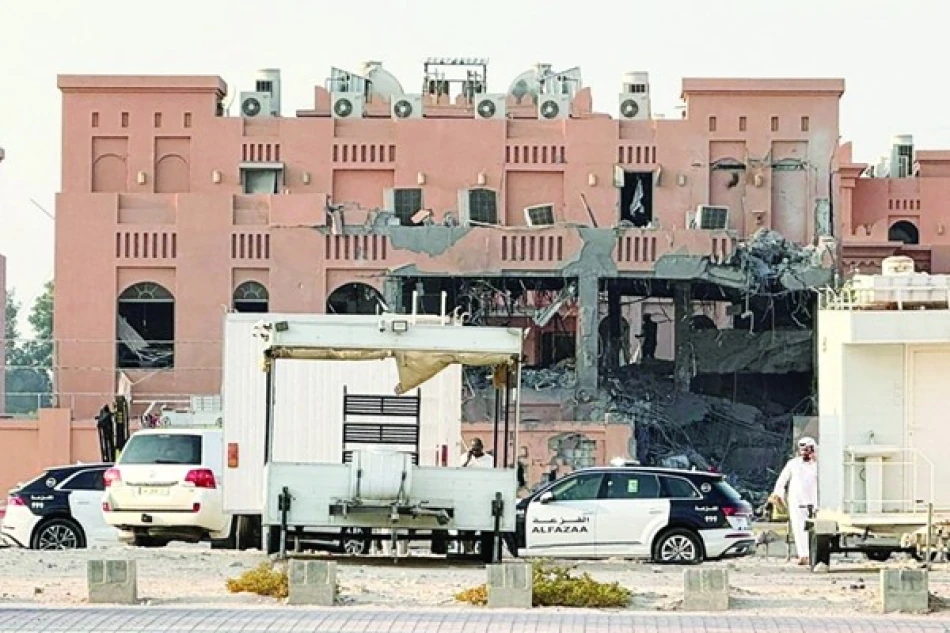
UAE Condemns Netanyahu's Aggressive Remarks on Qatar in Strongest Terms
Gulf Unity Emerges as Israel's Strike on Doha Triggers Regional Diplomatic Crisis
Israel's acknowledgment of conducting an attack targeting Hamas leaders in Qatar's capital has ignited an unprecedented diplomatic firestorm across the Arab world, with the UAE and Egypt rallying behind Doha in a show of Gulf solidarity that could reshape regional security dynamics. The incident has prompted Qatar to convene an emergency Arab-Islamic summit while exposing the complex contradictions in Israel's relationship with its mediating partners.
UAE Takes Bold Stand Against Israeli Aggression
The United Arab Emirates delivered one of its strongest condemnations of Israeli actions since normalizing relations through the Abraham Accords in 2020. The UAE Foreign Ministry declared that Qatar's security is "an integral part" of Gulf Cooperation Council stability, effectively drawing a red line around any attacks on Gulf states.
This represents a significant diplomatic moment for the UAE, which has maintained warming ties with Israel while simultaneously strengthening its relationship with Qatar following the 2021 Al-Ula Declaration that ended the Gulf blockade. The UAE's forceful language suggests that Abraham Accords signatories are not willing to remain silent when Israeli actions threaten regional Arab partners.
Testing the Abraham Accords Framework
The UAE's position creates an uncomfortable dynamic for Israeli policymakers who have viewed Gulf normalization as providing diplomatic cover for military operations. By explicitly linking Qatari security to broader Gulf stability, the UAE is essentially telling Israel that strikes on Qatar could jeopardize the broader regional peace architecture that both sides have invested in building.
Qatar's Strategic Response: From Victim to Regional Convener
Rather than simply protesting the attack, Qatar has moved quickly to transform the incident into a broader regional cause. The announcement of an emergency Arab-Islamic summit scheduled for September 14-15 in Doha represents a masterful diplomatic pivot that positions Qatar as the defender of regional sovereignty rather than just another target.
Qatar's Foreign Ministry emphasized the contradiction in Netanyahu's position, noting that Hamas's political office in Doha operates at the explicit request of both the United States and Israel for mediation purposes. This highlights the impossible position Israel has created for itself—attacking the very infrastructure it relies upon for hostage negotiations and ceasefire talks.
The Mediation Paradox
The attack exposes a fundamental contradiction in Israeli strategy. Qatar has served as an indispensable mediator precisely because it maintains relationships with all parties, including Hamas. By targeting Hamas leaders in Doha, Israel undermines the mediation mechanism that has facilitated previous prisoner exchanges and temporary ceasefires that Israeli families and the international community have desperately sought.
Egypt's Calculated Support Signals Broader Arab Realignment
Egyptian President Abdel Fattah el-Sisi's decision to send Foreign Minister Badr Abdelatty to Doha with a personal message of solidarity represents more than routine diplomatic courtesy. Egypt's explicit statement that "any threat to Doha's security constitutes a direct threat to Arab national security" elevates the incident to the level of collective Arab security doctrine.
This is particularly significant given Egypt's own complex relationship with both Israel and Hamas. As the broker of the 2021 Gaza ceasefire and maintainer of the Rafah crossing, Egypt understands better than most the delicate balance required for regional mediation efforts.
Regional Security Architecture Under Stress
The incident occurs at a moment when Gulf states have been working to establish new security frameworks that don't rely exclusively on American protection. The I2U2 partnership between Israel, India, UAE, and the United States, along with various Abraham Accords initiatives, were designed to create interconnected security and economic relationships.
However, Israeli military actions that disregard the sovereignty of Arab partners threaten to unravel these carefully constructed arrangements. The UAE's strong response suggests that Gulf states are not willing to accept a framework where normalization with Israel comes at the cost of Arab solidarity.
International Implications and UN Security Council Response
The UN Security Council session featuring multiple Arab foreign ministers represents an attempt to internationalize the crisis beyond regional diplomacy. This approach mirrors successful Gulf strategies in other contexts, such as the international response to the 2019 attacks on Saudi oil facilities.
By framing the issue as a violation of international law and state sovereignty rather than simply an anti-Israeli action, Arab diplomats are seeking to build broader international support that could include European and other partners who have invested in Middle East stability.
Market and Economic Considerations
Qatar's position as a major liquefied natural gas supplier to Europe and host to significant international sporting events means that threats to its stability carry economic implications far beyond the region. The country's massive sovereign wealth fund and its investments across global markets make Qatari security a concern for international investors.
The diplomatic crisis also threatens to complicate Israel's own economic integration efforts in the Gulf, potentially slowing investment flows and joint ventures that have emerged from the Abraham Accords normalization process.
Looking Forward: A Test of Regional Order
The coming weeks will reveal whether this incident represents a temporary diplomatic crisis or a more fundamental shift in regional dynamics. The success of Qatar's emergency summit in generating concrete responses will indicate whether Arab states are prepared to move beyond rhetorical support to more substantive measures.
For Israel, the episode demonstrates the limits of military solutions when they conflict with diplomatic necessities. The country now faces the challenge of maintaining its security operations while preserving the mediation channels and regional relationships essential for long-term stability.
The crisis ultimately tests whether the emerging Middle East order can accommodate both Israeli security concerns and Arab sovereignty principles—or whether these remain fundamentally incompatible in the current regional framework.
Most Viewed News

 Layla Al Mansoori
Layla Al Mansoori






